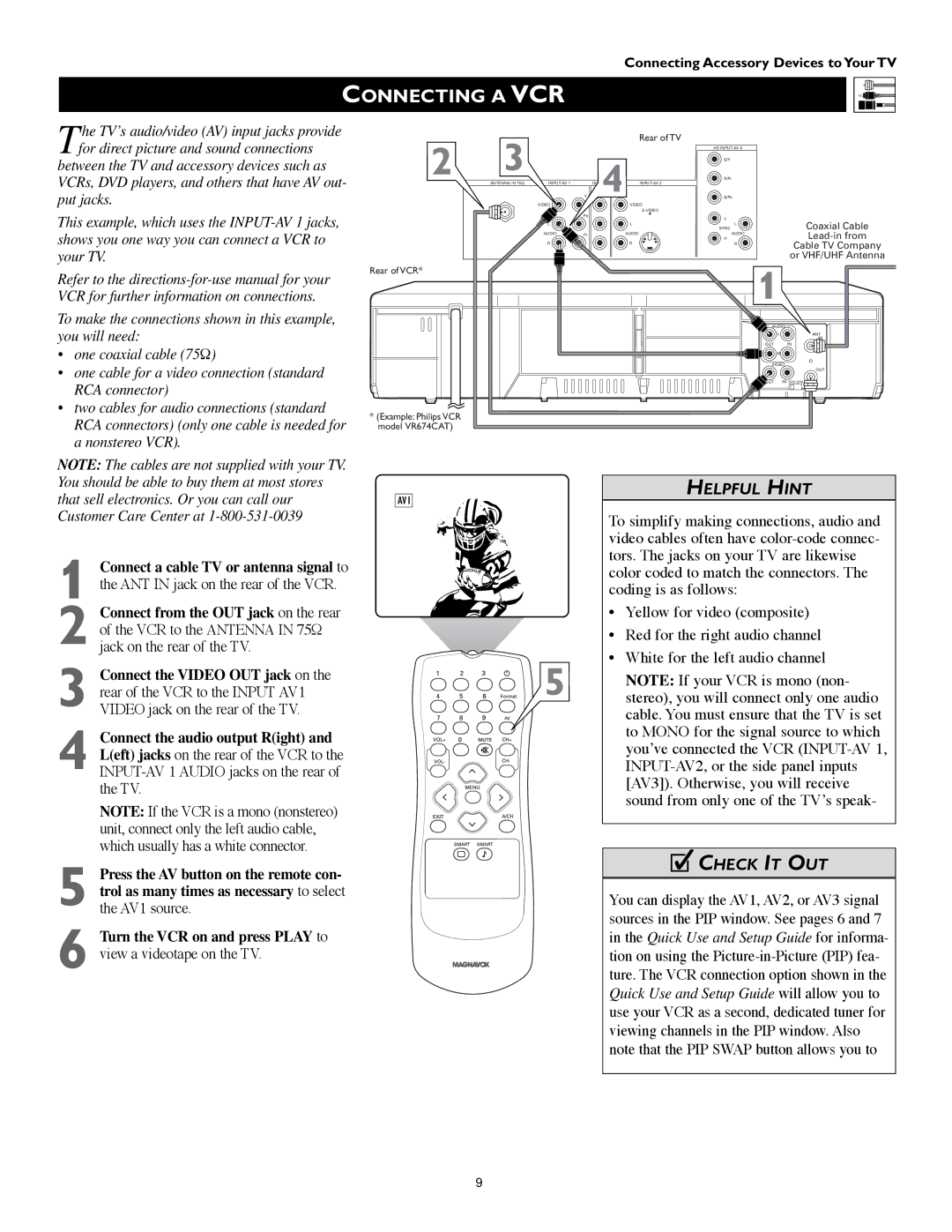
Connecting Accessory Devices to Your TV
CONNECTING A VCR
The TV’s audio/video (AV) input jacks provide for direct picture and sound connections
between the TV and accessory devices such as VCRs, DVD players, and others that have AV out- put jacks.
This example, which uses the
Rear of TV
2 | 3 |
|
|
| HD |
|
| 4 | G/Y | ||
|
| R/Pr | |||
| ANTENNA IN 75Ω | Y | B/Pb | ||
|
| VIDEO |
| VIDEO |
|
|
|
|
|
| |
|
|
| Pb | L |
|
|
|
|
| V | |
|
|
|
|
| |
|
| L |
| L | L |
|
|
|
|
| SYNC |
|
| AUDIO | Pr | AUDIO | AUDIO |
|
|
|
|
| H |
|
| R |
| R | R |
Coaxial Cable
Refer to the
To make the connections shown in this example, you will need:
•one coaxial cable (75Ω)
•one cable for a video connection (standard RCA connector)
•two cables for audio connections (standard RCA connectors) (only one cable is needed for a nonstereo VCR).
NOTE: The cables are not supplied with your TV. You should be able to buy them at most stores that sell electronics. Or you can call our Customer Care Center at
1 Connect a cable TV or antenna signal to the ANT IN jack on the rear of the VCR.
2 Connect from the OUT jack on the rear of the VCR to the ANTENNA IN 75Ω jack on the rear of the TV.
3 Connect the VIDEO OUT jack on the rear of the VCR to the INPUT AV1 VIDEO jack on the rear of the TV.
4 Connect the audio output R(ight) and L(eft) jacks on the rear of the VCR to the
NOTE: If the VCR is a mono (nonstereo) unit, connect only the left audio cable, which usually has a white connector.
5 Press the AV button on the remote con- trol as many times as necessary to select the AV1 source.
6 Turn the VCR on and press PLAY to view a videotape on the TV.
Rear of VCR* | 1 |
|
|
| |
| AUDIO | |
| L | ANT |
|
| IN |
| OUT | IN |
| R |
|
| VIDEO | |
|
| OUT |
| OUT | IN CH3 CH4 |
*(Example: Philips VCR model VR674CAT)
AV1 | HELPFUL HINT |
| |
| To simplify making connections, audio and |
| video cables often have |
| tors. The jacks on your TV are likewise |
| color coded to match the connectors. The |
| coding is as follows: |
| • Yellow for video (composite) |
| • Red for the right audio channel |
5 | • White for the left audio channel |
NOTE: If your VCR is mono (non- | |
stereo), you will connect only one audio | |
| cable. You must ensure that the TV is set |
| to MONO for the signal source to which |
| you’ve connected the VCR |
| |
| [AV3]). Otherwise, you will receive |
| sound from only one of the TV’s speak- |
cCHECK IT OUT
You can display the AV1, AV2, or AV3 signal sources in the PIP window. See pages 6 and 7 in the Quick Use and Setup Guide for informa- tion on using the
9
